With a reincarnation, Mo Yan revisits the history of Communist China.
Originally published on Rue89- 30/8/2009.
Landowner or servant, all … Lire la suite
Originally published on Rue89- 30/8/2009.
Landowner or servant, all … Lire la suite
Originally published on Rue89, 14/8/2009.
Jia Pingwa is one of the favorite writers of the Chinese public. He received a few months ago, the most prestigious literary award, the Mao Dun prize. But the news ,in the middle of the holiday period, is the publication of one of his novels, ” Fallen Capital ” banned for pornography in 1993. The novel had, at that time, won in France the Prix Femina for foreign literature.
For … Lire la suite
Originally published on Rue89, 27/7/2009
For some people, Chinese novels are too long, too complex with a very large number of characters, also it is felt that a deep knowledge of Chinese civilization is needed. Moreover how to choose between writers of whom you know nothing and between books that are sometimes difficult to find !!!
These remarks led me to offer a list on rather strict bases: all books must have been published recently … Lire la suite
Originally published on Rue89, 24/6/2009.
The Chinese writer Mo Yan spent a week in France to present his books and his new novel to be releasd end of august.He met Rue89 with Bertrand Mialaret and Pierre Haski who had met him some years ago in Beijing. A meeting translated by Chantal Chen- Andro, translator of many books by Mo Yan.
Mo Yan is 53 years old, he was born in a village near Gaomi in … Lire la suite
Originally published on Rue89, 13/06/2009.
Only writers older than fifty years old are translated. The younger generation is not well known in the West as the works are not available, but fortunately exceptions of good quality do exist.
A generation at odds with the previous one:
Writers born after the beginning of the Cultural Revolution and the death of Mao Zedong (1976) have a very different approach from their predecessors. The turmoils of political history,
Originally published onRue89, 05/21/2009.
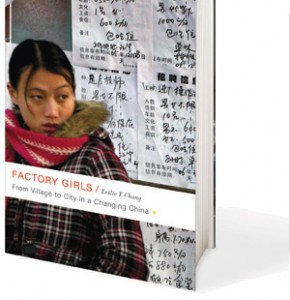 “Factory Girls…” the book of an American journalist of Chinese origin, Leslie Chang, who has been translated, is a survey of factory work, the professional and personal development of several young women that the author has followed in the extraordinary economic dynamism of the city of Dongguan, in southern China.
“Factory Girls…” the book of an American journalist of Chinese origin, Leslie Chang, who has been translated, is a survey of factory work, the professional and personal development of several young women that the author has followed in the extraordinary economic dynamism of the city of Dongguan, in southern China.
Dongguan 1.5 million or 6.5 million people?
Located in southern China, between Guangzhou and Shenzhen (one of the first special economic … Lire la suite
Originally published on Rue89-11/04/2009.
Seven books translated into French. The Chinese writer Su Tong is a favorite of the public who remembers the bright colors, the gorgeous scenery, the beauty of the actress Gong Li and the cruelty of the scenario of the film “Raise the Red Lantern” (1991 ), adapted from one of his novels.
“The Myth of Meng”, a book commissionned by a publisher: Su Tong is well known in the English-speaking countries … Lire la suite
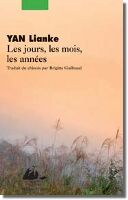 Editions P. Picquier have just published a third book by Yan Lianke, “The Days, the months, the years”. His previous books “Serve the People” and “The Dream of Ding Village,” published in China in 2005, had been banned; and the last one has received the Lu Xun prize, one of the most prestigious literary awards.
Editions P. Picquier have just published a third book by Yan Lianke, “The Days, the months, the years”. His previous books “Serve the People” and “The Dream of Ding Village,” published in China in 2005, had been banned; and the last one has received the Lu Xun prize, one of the most prestigious literary awards.
Is the “hero” of the book the grandfather, his dog or growing corn?
“The Day … Lire la suite
Originally published on Rue89-02/14/2009.
 Can you become a millionaire when you are a writer in China? The writers that the Chinese Communist Party try with some success to control, certainly live better than during the time of the Writers’ Union. The market pressure is ambivalent, it can increase but also reduce the control of the “politically correct”.
Can you become a millionaire when you are a writer in China? The writers that the Chinese Communist Party try with some success to control, certainly live better than during the time of the Writers’ Union. The market pressure is ambivalent, it can increase but also reduce the control of the “politically correct”.
Larger royalties in Paris than in Beijing:
“How do the French writers earn their living,” this article in
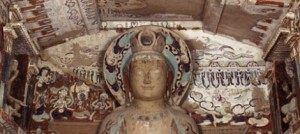 In China, four complexes of cave-shrines (Dunhuang, Dazu, Longmen, Yungang) are part of the World Heritage Sites listed by Unesco. The most famous site, the caves of Dunhuang, is highlighted by a remarkable exhibition organized jointly by the China Cultural Centre in Paris and the Musée Guimet.
In China, four complexes of cave-shrines (Dunhuang, Dazu, Longmen, Yungang) are part of the World Heritage Sites listed by Unesco. The most famous site, the caves of Dunhuang, is highlighted by a remarkable exhibition organized jointly by the China Cultural Centre in Paris and the Musée Guimet.
The Dunhuang Caves:The caves, located near the oasis of Dunhuang, on the southern route of the Silk Road are more than three thousand … Lire la suite
Originally published on Rue89- 12/14/2008 .
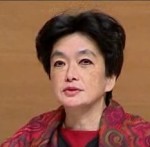 An opening speech can be of very high quality. Such was the case, last Thursday,with the opening lecture by Anne Cheng, newly appointed Professor of Intellectual History of China at the “College de France”.
An opening speech can be of very high quality. Such was the case, last Thursday,with the opening lecture by Anne Cheng, newly appointed Professor of Intellectual History of China at the “College de France”.
A bridge between cultures:
“Daughter of Chinese parents, between a father who stayed in France ( Francois Cheng, the novelist and poet, member of the Academie Française) and a mother who returned to Mao’s China … Lire la suite
Originally published on Rue89, 24/11/2008 .
If you are a vegetarian, do not read this novel! You will live in modern China, the passion for meat, the slaughtering, processing, consumption of … Meat and alcohol as allegories of greed and modern debauchery.
Boasting and lying, a “canon child”:
Two periods of time, a decade apart, are simultaneously used in the forty-one chapters, as the story telling by a child, Xiaotong Luo. As an adult, he
Originally published on Rue89, 10/05/2008.
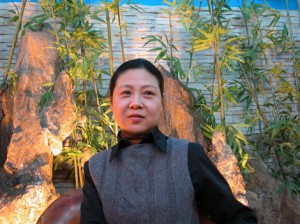 Eight novels by Chinese novelist Chi Li have been translated into French. The last and one of the most uncommon, “Wild grass around wheat” is published this week.
Eight novels by Chinese novelist Chi Li have been translated into French. The last and one of the most uncommon, “Wild grass around wheat” is published this week.
A good writer; for ten years, several translators and one publisher have struggled to make her popular with French readers. It is a lengthy process that should be welcomed because, in English, not a line is translated.
Her daughter disappears in Beijing: … Lire la suite